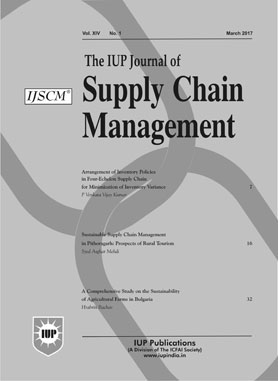
Dec 21
The IUP Journal of Supply Chain Management
Focus
The second paper, "Fashion Industry and Sustainability: A Circular Economy Approach" by Hemantha Y, highlights the paradigm shift in business approach towards environment and sustainable future. The author states that companies have started adopting sustainable business practices using circular economic model for protecting the ecology and businesses across the globe. Sustainability and circular economy, which have been a practice by a majority of electronic manufacturers, have also been adopted by the companies in fashion industry. However, there is scarcity of literature on circular fashion that can benefit the academicians and practitioners working in this area. This study highlights the benefits of circular fashion and also presents the detrimental effects of linear economy on biosphere. Further, the paper attempts to provide the development of circular fashion in terms of redesigning recycling system, sourcing, chemical recycling, etc.
Gilles Pache, in his research note, "Post-Covid-19 Supply Chain World: Everything Changes but Nothing Changes", highlights the important lessons which business world can learn from the Covid-19 pandemic. The author states that contemporary logistics collided violently with the spread of Covid-19, which has questioned the relevance of logistical models based on an international division of labor. The pandemic forced the business world to think of a different organizational model in the coming years. The author reviews the concept of "logistization" by Fabbe-Costes and Rouquet (2019), which refers to the extent to which the internationalization of markets was the result of perfect control of global supply chains. The author highlights that the concept of "logistization" was undermined by a simple coronavirus, leading to supply chain paralysis across the globe. The author compares "logistization" with the concept of "short supply chains", which could be a new dominant model based on geographical proximity.
Consulting Editor
Supply Chain Transformation with Blockchain Deployment: Enhancing Efficiency and Effectiveness
Blockchain is considered the most trending technology that may significantly impact businesses across the globe as it streamlines deficiencies of inter- and intra-organizational business processes by making them immutable, decentralized, secure, transparent, and operational-efficient. The applications of blockchain have begun to revolutionize different aspects of supply chain and operations management and help in reducing costs and risks and improving quality, flexibility, speed, and sustainability. Blockchain adds the most value to supply chains through its extended visibility and product traceability and makes supply chains more responsive and resilient against market disruptions. The study explores the deployment of blockchain technology to supply chain operations and differentiates traditional supply chains versus blockchain-enabled supply chains. It develops various frameworks to highlight the likely improved performance as blockchain deployment enhances the efficiency and effectiveness of the supply chain and ultimately leads to competitive advantages.
Fashion Industry and Sustainability: A Circular Economy Approach
Circular fashion approach plays a significant role in fashion and textile manufacturing, which global fashion houses have adopted to be sustainable in future. This study addresses the conceptual contours for understanding circular fashion by presenting an extensive literature review on the same. The study presents the benefits of circular fashion and the detrimental effects of linear economy on biosphere, and recommends shifting to circular economy. Further, the paper traces the developments in circular fashion in terms of redesigning recycling system, sourcing, chemical recycling, etc.
Post-Covid-19 Supply Chain World: Everything Changes but Nothing Changes